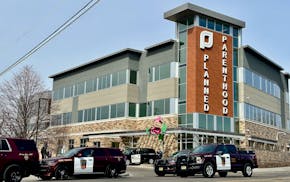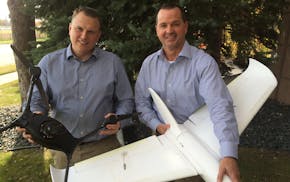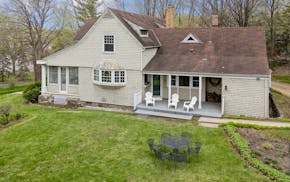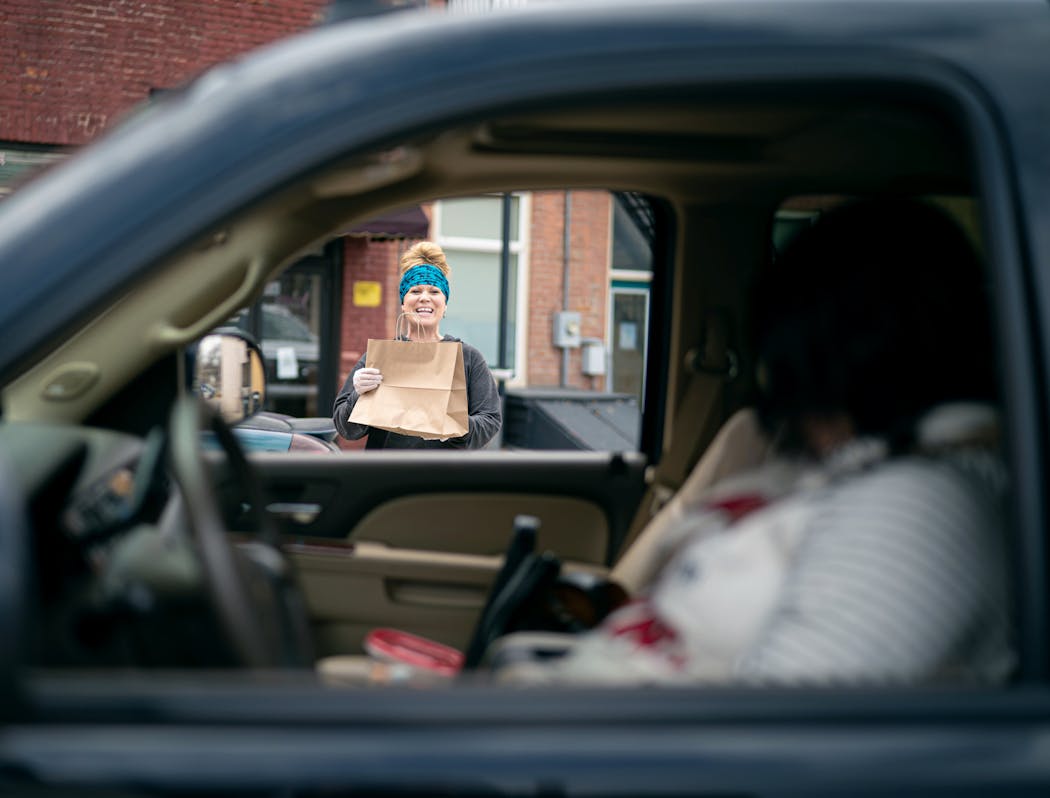Hutchinson, Minn. – Joe McCormick is a man in motion.
Since reopening at half-capacity in January, tables at his McCormick's Family Restaurant fill up with people hankering for fresh popovers and a chance to laugh and visit again.
But the restaurant is so short-staffed that McCormick is busing tables, seating customers and occasionally standing behind the grill himself. He recently decided to close on Mondays so he and his staff could get a break.
"If I had staff, I wouldn't even consider closing," he said. "I'm trying to stay a step ahead of it. I can't wear my people out."
The scene is a far cry from this time last year, when McCormick shut the doors to slow the spread of the coronavirus. Now as pandemic restrictions ease and the rollout of vaccines continues, this central Minnesota city is coming back to life.
Pedestrians stroll Hutchinson's new and wider sidewalks, the upside of an $11.5 million reconstruction of Main Street that business owners thought was their biggest existential threat before the pandemic. The bank lobby is open, the vacuum repair shop is taking orders and display cases at Hager Jewelry are filled.
However, Zellas, an upscale restaurant on Main Street, closed in July after trying just patio service and takeout. Organizers of the RiverSong music festival, canceled last year, will wait until May to decide if it will be safe to go on this summer.
While there is optimism, business owners and civic leaders temper it with crossed fingers.
"I will tell you," said Tim Ulrich, chief executive of Citizens Bank, "Main Street in Hutchinson isn't as healthy as it once was. But without all these various types of financial supports, it would be just brutal."
Citizens Bank, which has done business from the same location in downtown Hutchinson since 1892, processed more than 300 forgivable loans from the federal government worth $25 million to small- and midsize businesses last year. It's now working through a second round of 200-plus applications for another $15 million.
"In the first 60 days, everybody panicked because they'd never experienced something like this before," Ulrich said. "Now they've adjusted and understand they're going to be able to stay in business because of the various forms of support they've gotten."
Leah Watzke, owner of the Hair Lounge, is working more days and longer hours, sometimes for less pay, as the business restricts capacity. Stylists no longer double up on clients by cutting hair in one chair and doing a color in another.
Even so, Watzke said, "I'm grateful everyone has been healthy. I'm optimistic and feeling good about the year ahead."
Spared for months
Hutchinson is city of about 15,000 in McLeod County, an hour west of Minneapolis along the south fork of the Crow River.
It took longer for the coronavirus to turn deadly in this part of the state. McLeod County reported its first COVID-19 death on Aug. 18, five full months after the state's first death, in Ramsey County. During that time, frustrations simmered among some in this Republican stronghold over restrictions ordered by Gov. Tim Walz.
But market forces also struck. At Goebel Fixture, a maker of cabinetry for hotels and upscale retailers, sales disappeared almost overnight.
"We lost millions of dollars' worth of orders over a weekend, basically," said Matt Field, the firm's chief executive and a fourth-generation member of its founding family. "Things were happening so fast, I remember talking to everyone in the plant in the morning and going back out there in the afternoon to tell them something different."
The company, one of Hutchinson's oldest and largest private employers, laid off all but 10 of its 100 workers. And sales in the April-to-June quarter were just 6% of what they'd been a year earlier.
To date, 54 people in McLeod County have died of the respiratory illness caused by the coronavirus. Cases in Hutchinson and the county have tracked below the state average in general, but spikes came from outbreaks among food workers in agricultural areas and in the city's bars and restaurants.
Neither McCormick nor his restaurant was spared.
Last fall, three of his employees, including one cook, tested positive. Two patrons said they tested positive, and then McCormick caught it. State officials tied 26 cases to McCormick's Family Restaurant, one of six bars or restaurants in the area named in outbreaks in November and December. The virus' resurgence led Walz in November to order a second statewide shutdown of the hospitality industry.
"At that time around Hutchinson, there were full-blown cases everywhere," McCormick said. "We were doing everything right. Everyone was wearing masks, we were cleaning and maintaining 6-feet distance."
A new kind of creative
That push-pull between opening up the economy and preventing the spread of a deadly disease still weighs on business owners.
"I constantly feel like I'm treading water," said Tara Tepley, who owns the Paint Factory and leads group painting classes with upbeat music. "Just when I feel I see land to start swimming to? Nope, false alarm. Keep treading."
Tepley sips tea from a mug that says "pivot" because, she says, that's been the theme of her life.
She launched the Paint Factory eight years ago in a historic building on Main Street, hoping to prove that anyone can be an artist. When it was forced to close last year, Tepley posted instructional videos on Facebook, using wood crates, Mason jars and anything else she could find in her house.
One day, she did a how-to for a marbling technique using her toilet seat lid. "I was trying to get people to laugh and stay inspired and creative," she said.
With clients clamoring for projects, Tepley started selling kits that included a canvas, brushes and paints. People picked them up outside of her building and tuned in for "Friday Night Live" classes on Facebook. Tepley taught and her brother Todd served as karaoke DJ. Hundreds watched, including painters in Brazil and Texas. Grants totaling $40,000 helped.
The Paint Factory reopened to 25% capacity in January but didn't reach that limit until this month.
The mood at a recent event felt like a reunion of old friends. Three painters were first-timers and two signaled it was their first time out in the pandemic.
While painters worked on "Moonlit Windmill," Tepley's brother played ABBA and the Beach Boys. Her father, Bob, did the two-step boogie to "The Git Up."
"It's good therapy," said Sara Lenzen.
Tepley makes sure participants stay 6 feet apart and that no one shares tools or paint.
"I had many restless nights," Tepley said. "I'm a survivor anyway. My attitude is to push and keep going."
Goebel Fixture recalled workers in May, after receiving a forgivable loan of about $2.6 million from the federal Paycheck Protection Program. It now has 79 workers and is looking for more.
"I'm not a big fan of government subsidies and any government handouts," Field said. But he added, "In our case, the PPP loan worked the way it should have."
Pushed out
Inside Zellas restaurant, a chirping smoke detector echoes through the empty dining room. Co-owner Sara Pollmann closed the restaurant for good July 18, following a send-off from customers that left many people in tears.
Pollmann felt the tug between pocketbook concerns and public safety acutely. Her husband, Brian, is chief medical officer at the local hospital and oversees its pandemic team.
Before the virus, the couple spent $25,000 to update the building and patio, eager to spiff up their building when the road construction ended. After the pandemic hit, a $75,000 PPP forgivable loan helped keep staff on the payroll through the first shutdown. But when Zellas reopened last summer, it still lost about $10,000 a month.
"In hindsight, I might not have done the PPP because of what a challenge it was to keep all of the employees working and all the work that went into it, and pretty much not getting anything out of it," Pollmann said.
Last week, the couple signed a lease for a new restaurant to replace Zellas, which could open in June. Sara Pollmann went back to school to become a certified nursing assistant.
"We're going to be OK," she said. "But we had to let 24 people go. They had to go back on unemployment and try to find jobs. They were counting on that to make their house payment. Some needed a second job to do that."
Around Hutchinson as elsewhere, the promise of vaccines and reopening comes with wariness of the year just passed.
"We keep talking about 'when things get back to normal,' " said Ulrich, the banker. "Well, when is that going to be? Is that going to be 2022? What is a typical year going to be?"
jackie.crosby@startribune.com 612-673-7335

Planned Parenthood North Central States to lay off 66 workers, restructure presence in Minnesota

John Deere buys St. Paul precision ag company Sentera
New virus is wiping out Minnesota turkey flocks, costing farmers $112M so far

Part of the family for 75 years, 19th-century house near Lake Minnetonka listed at $2M


